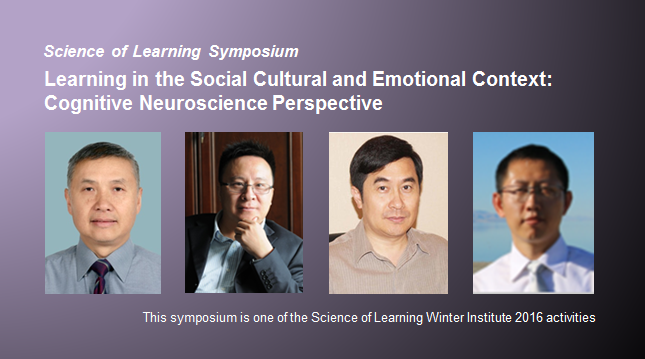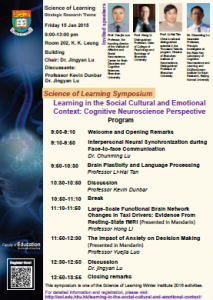Learning in the Social Cultural and Emotional Context: Cognitive Neuroscience Perspective (Winter Institute 2016)

Register
Date: 15 January 2016 (Friday)
Time: 09:00-13:00
Venue: Room 202 K. K. Leung Building [Refreshments will be served at the meeting]
Chair: Dr. Jingyan Lu
Discussants:
Professor Kevin Dunbar
Visiting Research Professor of the University of Hong Kong;
Director of the Laboratory for Complex Thinking, Creativity and Educational Neuroscience;
Professor of the Department of Human Development and Quantitative Methodology, College of Education, University of Maryland College Park
Dr. Jingyan Lu
Associate Professor, Faculty of Education, The University of Hong Kong
Learning is a complex phenomena involves not only cognitive process, but also social participation, emotional engagement, and bearing cultural imprint. This symposium brings top notch cognitive neuroscientists from China to share with us their recent cutting-edge research on how learning happens impacted by them. The symposium hopes to bring discussion on the implications of neuroscience research on learning and education.
Information of the talks and the speakers
Talk 1: Interpersonal Neural Synchronization during Face-to-face Communication
By Dr. Chunming Lu
Face-to-face communication plays a vital role in establishing and maintaining interpersonal relationships. Nevertheless, the neural basis of face-to-face communication has so far remained largely uncharted, due to limitations of neuro-imaging techniques which prohibited the study of neural dynamics in multiple, freely interacting people. These limitations may be overcome by functional near infrared spectroscopy (fNIRS), which a non-invasive brain imaging technique that measures the variation of oxygenated and deoxygenated haemoglobin at high temporal resolution. I will present experiments using fNIRS which examined interpersonal neural synchronization during face-to-face discussions in dyads (Experiment 1) and 3-person groups (Experiment 2). The results revealed evidence of interpersonal neural synchronization processes, which were associated with the success of social communications, and played an important role in establishing leadership in a group. The results may help to understand the ethology and treatment of various communication disorders.
Dr. Chunming Lu, Ph.D., Associate Professor, Principle Investigator at the State Key Laboratory of Cognitive Neuroscience and Learning and IDG/McGovern Institute for Brain Research, Beijing Normal University. His research interests include neuropsychology, cognitive science and biological psychology.
Talk 2: Brain Plasticity and Language Processing
By Prof. Li-Hai Tan
Neuroplasticity refers to the brain’s ability to reorganize itself by forming new neural pathways due to changes in behavior, cognition, and environment. Contrary to the conventional wisdom, recent neuroscience research indicates that experience can quickly change both the human adult brain’s physical structure (anatomy) and functional organization (physiology). In this talk I will summarize structural and functional MRI evidence from the studies of language to show that how the anatomical and functional networks of the normal adult brains change in response to language learning. Evidence from the brain-damaged patients will also be reviewed, suggesting that cortical dynamics adjust their activities to compensate for injury and disease. The promises and challenges of translating basic neuroimaging research into clinical practice require us to carefully investigate individual- and culture-related neuroplasticity in order to preserve critical life skills such as language and motor for patients after the neurosurgery.
Prof. Li-Hai Tan, China’s national distinguished scientist in the Thousand Talents program, Director of Shenzhen Institute of Neuroscience, Distinguished Professor of Shenzhen University School of Medicine, Principal Scientist of National Basic Research Program of China (973 program) (2012-2016), former Director of State Key Lab of Brain and Cognitive Science of HKU. His research interests include neuroimaging studies of language and memory.
Talk 3: Large-Scale Functional Brain Network Changes in Taxi Drivers: Evidence From Resting-State fMRI
By Prof. Hong Li
Driving a car in the environment is a complex behavior that involves cognitive processing of visual information to generate the proper motor outputs and action controls. Previous neuroimaging studies have used virtual simulation to identify the brain areas that are associated with various driving-related tasks. Few studies, however, have focused on the specific patterns of functional organization in the driver’s brain. The aim of this study was to assess differences in the resting-state networks (RSNs) of the brains of drivers and nondrivers. We then examined the group differences in the intrinsic brain activity of each RSN and in the functional network connectivity (FNC) between the RSNs. We found that the drivers had reduced intrinsic brain activity in the visual RSNs and reduced FNC between the sensory RSNs compared with the nondrivers. The major finding of this study, however, was that the FNC between the cognitive and sensory RSNs became more positively or less negatively correlated in the drivers relative to that in the nondrivers. Notably, the strength of the FNC between the left frontoparietal and primary visual RSNs was positively correlated with the number of taxi-driving years. Our findings may provide new insight into how the brain supports driving behavior.
Prof. Hong Li, Distinguished Professor, Dean of College of Psychology and Sociology of Shenzhen University, former Director of MoE State Key Lab of Cognition and Personality at Southwest University, Chongqing, Chang Jiang Scholar. His research interests include inductive reasoning, emotion and cognition interaction, cognitive development and complex cognitive processes.
Talk 4: The Impact of Anxiety on Decision Making
By Prof. Yuejia Luo

![]()
![]() Anxiety is an unpleasant emotional state or condition characterized by feelings of tension, apprehension, and worry. Excessive or inappropriate anxiety negatively affects social life. High trait anxious individuals are linked with negative cognitive bias and fear/avoidance behavior in social interaction. Decision making can be regarded as an outcome of mental processes (cognitive process) leading to the selection of a course of action among several alternatives. Every decision-making process produces a final choice. We would use the event-related brain potential (ERP) and fMRI technique to study neural correlates of decision making.
Anxiety is an unpleasant emotional state or condition characterized by feelings of tension, apprehension, and worry. Excessive or inappropriate anxiety negatively affects social life. High trait anxious individuals are linked with negative cognitive bias and fear/avoidance behavior in social interaction. Decision making can be regarded as an outcome of mental processes (cognitive process) leading to the selection of a course of action among several alternatives. Every decision-making process produces a final choice. We would use the event-related brain potential (ERP) and fMRI technique to study neural correlates of decision making.
Yue-jia Luo, PhD, Professor, the founding director of the Institute of Affective and Social Neuroscience, Center for Brain Disorders and Cognitive Sciences, Shenzhen University. He was director at National Key Laboratory of Cognitive Neuroscience, Beijing Normal University and dean of the School of Brain and Cognitive Sciences there. Memberships at Society for Social Neuroscience, Association for Psychological Sciences, Chinese Psychological Society, Chinese Neuroscience Society, and Chinese Society of Cognitive Science. Currently, Dr. Luo focuses his research interesting mainly on the social cognitive neuroscience. He established the first Chinese Affective Stimulating System, investigated the relationship and neural correlates between emotion and cognitive processing using the latest technology with ERP and fMRI. Dr Luo’s research works reveal neural mechanisms and computational processes underlying emotion and cognition processing in the brain, such as perception, attention, memory, decision making, thinking, and other cognitive tasks. He published 6 books and 400 academic papers since 1990, and 180 of them embodied by SCI/SSCI academic journals.






